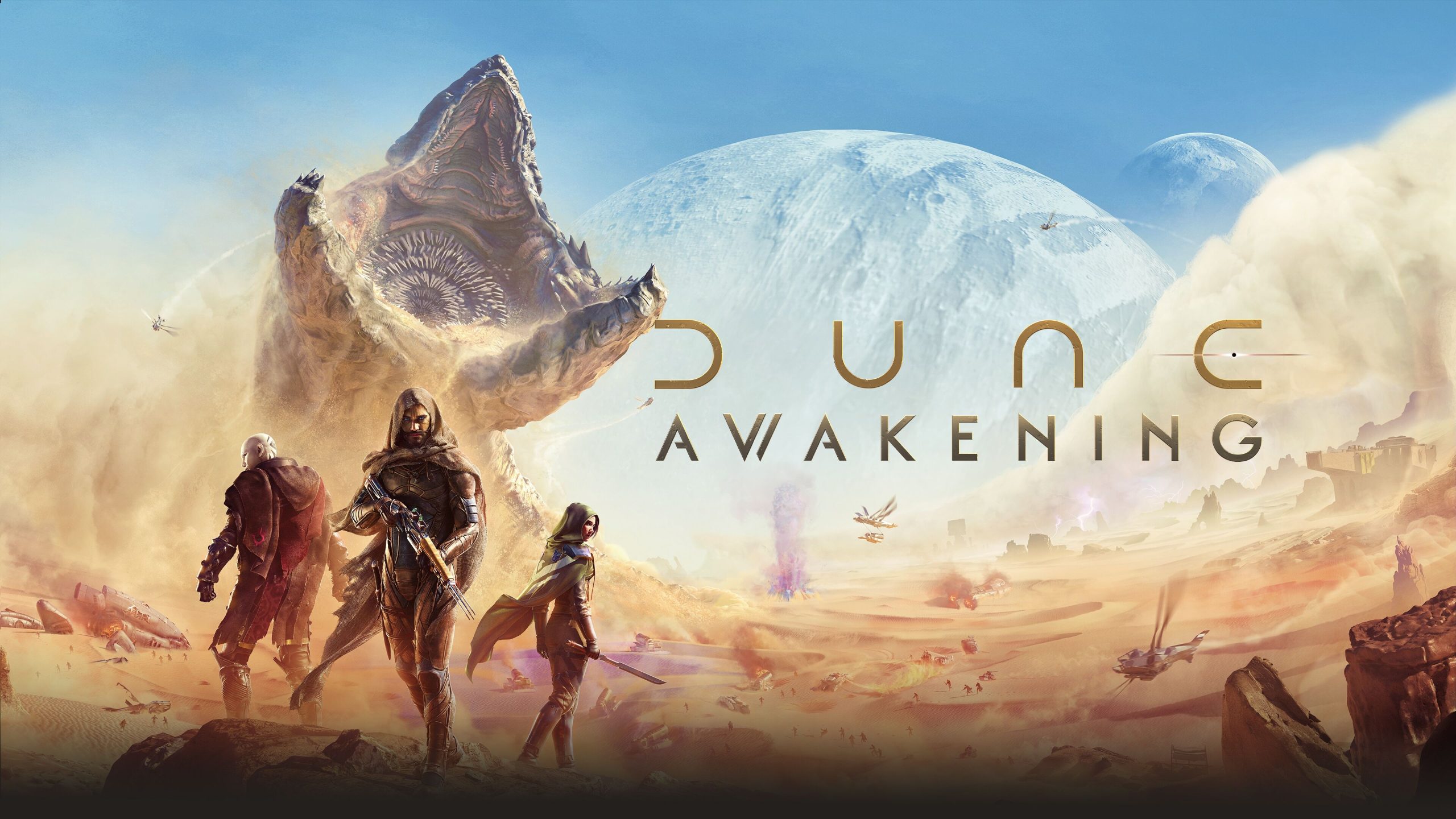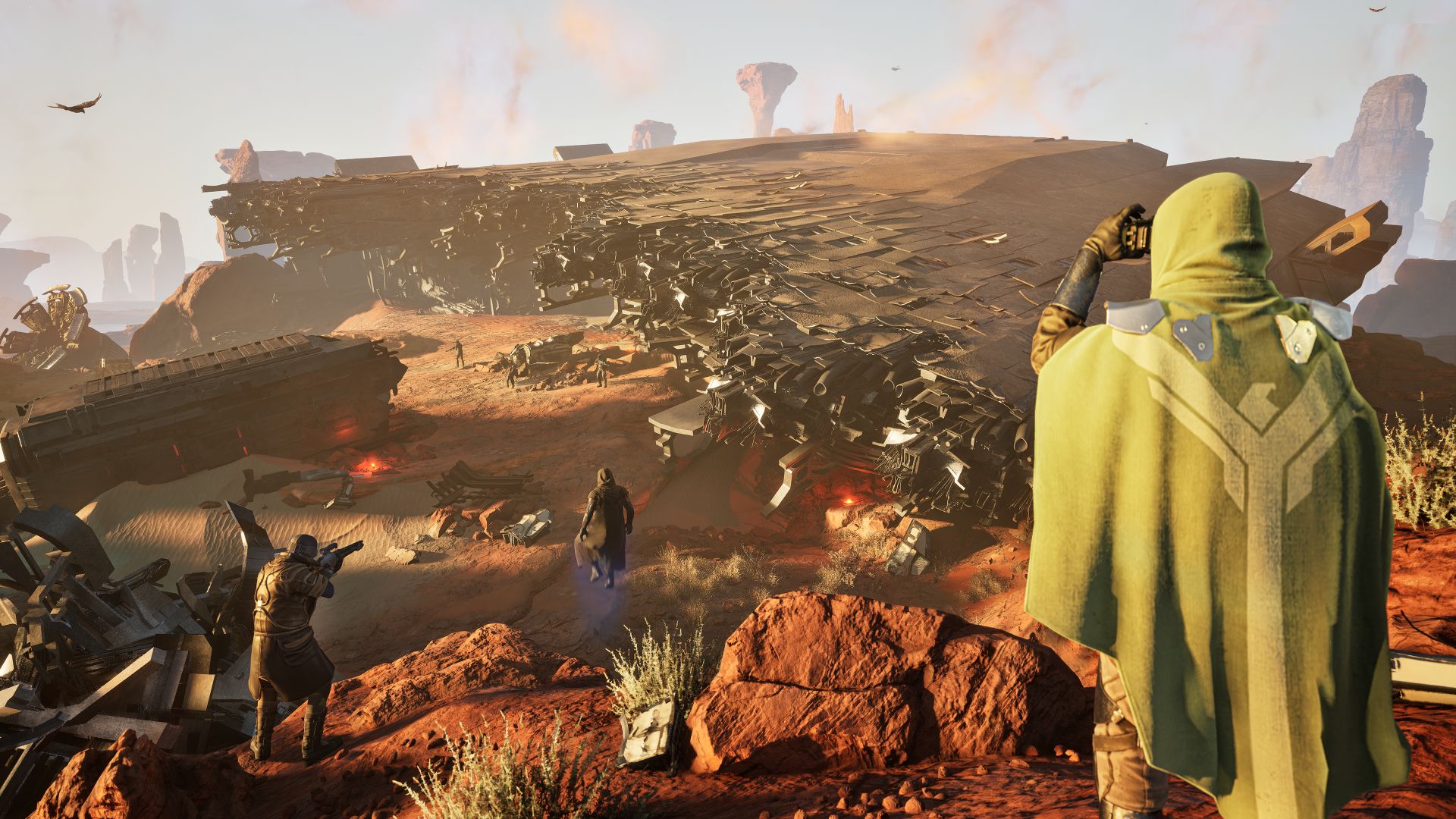The sands of Arrakis are stirring once again as Dune: Awakening, the highly anticipated open-world survival MMO from Funcom, has officially entered one of its largest and most ambitious beta tests yet. Running from May 9 to May 12, 2025, this closed beta offers players an unprecedented opportunity to explore the brutal world of Frank Herbert’s legendary universe through a lens of survival, exploration, and large-scale multiplayer interaction.
For the first time, the beta comes without an NDA, meaning players are free to stream, record, and share their adventures across the wastelands of Arrakis. It’s a major moment not just for Funcom, but for the growing wave of survival MMOs trying to blend narrative, exploration, and community-driven gameplay in a persistent world.

What’s New In This Beta?
Players diving into this latest test will experience roughly 20 to 25 hours of gameplay, covering most of Act 1’s content. Key regions such as Hagga Basin South and the Vermilius Gap are now fully explorable, bringing to life the towering dunes, shifting sands, and hidden secrets of Arrakis.
Highlights of the beta experience include:
- Survival Mechanics: Players must manage hydration, navigate dust storms, and avoid the deadly threat of roaming sandworms — iconic to the Dune universe. Sandworms are not just environmental hazards; if they devour you, your gear is permanently lost, adding real tension to every expedition.
- Base Building: For the first time, players can establish strongholds using the CHOAM tile set, reinforcing the MMO’s theme of resource competition and territorial control.
- PvP and PvE Elements: Whether you’re fending off rival players or braving the environmental dangers, every decision on Arrakis feels high stakes.
- Open Progression: Unlike traditional MMOs, Dune: Awakening is aiming for a fluid classless system, allowing players to specialize and adapt depending on survival needs.
Early feedback has been largely positive about the survival aspects — with some players calling it “one of the most immersive survival sandboxes ever attempted.” However, there’s also cautious optimism about the MMO layer. Systems like politics, alliances, and communal base building show potential but will need more polish before launch.
How to Join the Beta
There are two main ways to jump into this exciting phase:
- Request Access on Steam: Visit the Dune: Awakening Steam page and hit the “Request Access” button under the Playtest section.
- Global LAN Party Giveaway: Funcom is celebrating with a massive Global LAN Party on May 10, broadcasting live from London and PAX East in Boston. During the event, “tens of thousands” of beta keys will be handed out to lucky fans around the world — a move designed to flood the servers with players and stress-test the systems.
A Harsh Yet Beautiful World
Funcom’s team has emphasized that their goal is to portray Arrakis not just as a backdrop but as an active, living threat. From resource scarcity to environmental dangers and shifting political sands, survival will mean more than just crafting gear — it will demand smart alliances, calculated risks, and adaptability.
Unlike many survival MMOs that rely on fantasy tropes, Dune: Awakening is grounded heavily in science fiction realism. Water is currency. Sandworms are unavoidable. And your choices on where to build, how to move, and who to trust will shape your destiny.
Players can also expect intricate systems tied to spice harvesting — a key pillar of Dune’s lore — though larger-scale spice wars and political machinations appear to be reserved for later stages of the beta or post-launch content.
Release Date and Early Access
If you don’t make it into this beta, there’s still hope. Dune: Awakening is officially set for release on June 10, 2025, across PC and next-gen consoles. Fans who pre-order the Deluxe or Ultimate Editions will receive early access starting June 5, giving them a critical head start on establishing dominance on the harsh sands of Arrakis.
This beta represents one of the most significant moments yet in the game’s development, offering a real glimpse at whether Dune: Awakening can live up to its massive potential. If Funcom succeeds, it won’t just be another survival game — it could become the definitive online Dune experience for years to come.
Key Takeaways
- The Dune: Awakening beta gives early access to core features.
- Players can join future beta weekends for feedback and testing.
- The game focuses on survival and multiplayer action in a vast desert world.
Dune: Awakening Beta Overview
Dune: Awakening’s beta test lets players explore the open world and test its survival mechanics before the full release. The beta is important for both developer Funcom and players who want early access and a chance to shape the game.
Accessing the Beta
Players can join the Dune: Awakening beta by signing up for access on the official website or through Steam. Funcom, the developer, sends out invitations to select users based on registration and system compatibility.
Entry is not guaranteed to all applicants. Funcom limits access, often choosing people who have up-to-date PCs or next-gen consoles like the PlayStation 5 and Xbox Series X/S. Participants receive details, such as download links and feedback instructions, via email upon selection.
The testing window varies. Some players report taking part for 20 to 25 hours within a fixed test period. Beta testers are usually under a Non-Disclosure Agreement (NDA), so not all feedback or footage is public.
Beta Test Features
The beta covers the early sections of Dune: Awakening’s vast map. Players can gather resources, craft items, and interact with others in an open world. The experience focuses on surviving the harsh desert, facing aggressive wildlife, and exploring new zones.
Content is limited. Funcom includes only a few story elements, basic quests, and the first three areas for testers to explore. Inventory management, base building, and player-versus-player (PvP) conflicts make up much of the gameplay loop.
Some elements, like full storylines and events, are absent or incomplete. Players must offer feedback on balance, mechanics, and bugs. The developers use input from beta testers to improve the overall game before the release date.
Supported Platforms
Dune: Awakening supports PC (Steam), PlayStation 5, and Xbox Series X/S during the beta. Funcom aims to test performance across various systems and hardware.
Most beta testers join through Steam on PC, as this platform received the first wave of invites. Console support for PS5 and Xbox Series X/S follows as development progresses and more keys become available.
Minimum system requirements vary but focus on modern components to handle the large-scale, multiplayer environment. Players should check device compatibility before applying. No support for older consoles or lower-end PCs is stated.
Gameplay, World, and Core Features
Dune: Awakening is set on the desert planet Arrakis, offering a persistent online world where survival depends on resource management, combat skills, and strategic alliances. Key features include in-depth character creation, unique vehicles like ornithopters, and a range of MMO systems built around an alternate take on Frank Herbert’s universe.
Arrakis Setting and Exploration
Arrakis, also known as Dune, forms the heart of the game’s world. The planet’s endless deserts are dangerous and breathtaking, peppered with immense sand dunes, rocky outcrops, and ancient ruins. Sandworms roam beneath the surface, forcing players to travel with caution and listen for warning signs in the sand.
The game supports open-world exploration with few limits. Players will encounter shifting geography, extreme weather, and lost secrets. Safe zones are rare; most areas demand preparation and vigilance because sandstorms or hostile creatures can appear without warning.
Landmarks from both the novels and Denis Villeneuve’s films feature across the map. Recognizable places like Sietch Tabr give fans a sense of continuity with previous Dune stories. The world feels reactive, and navigation tools help locate objectives, bases, and resources across the perilous desert.
Survival Mechanics
Living on Arrakis is a constant struggle. The game emphasizes core survival features inspired by both the books and classic survival games. Managing thirst, exposure, and inventory is core to gameplay. Searching for water and creating stillsuits are frequent tasks to avoid dehydration.
Finding shelter from heat and sandstorms is essential, so players must plan their travel. Supplies can run out fast, requiring players to stock up before venturing far from safety. Crafting plays a big part—a simple stilltent or water collector can mean the difference between life and death.
Food, water, and gear degrade over time. Death comes quickly with poor planning, and sandworms can destroy equipment left unattended on the sand. These challenges force players—especially those new to survival games—to learn careful management and forward planning.
Combat System
Combat in Dune: Awakening combines ranged weapons, melee attacks, and stealth. Weapons include knives, lasguns, and other items inspired by the Dune books and films. The combat mechanics stress timing and positioning, with quick reactions needed to survive threats from both creatures and rival players.
The environment plays a role in fights. Sandstorms can hide movement or break line of sight, while rocky outcrops allow for cover or ambushes. Sound matters; running or fighting on sand can attract sandworms. Combat with humans differs from battle with sandworms or other creatures, demanding players adapt their approach.
There is both PvE (player versus environment) and PvP (player versus player) combat. Forming squads or alliances can be the edge needed to survive large encounters, especially when resources are at stake. Skill trees allow players to specialize as fighters, scouts, or tacticians.
Factions and Major Characters
Several factions shape the politics and dangers of Arrakis. Players may align themselves with the Fremen, House Atreides, House Harkonnen, smugglers, or other minor groups. Each faction offers unique quests, rewards, and changes how other players see you.
Major characters from the Dune universe appear in the game. Paul Atreides, for example, may guide, oppose, or interact with player decisions based on the chosen story route. Factions often compete for territory and resources, pulling players into ongoing conflicts.
Factions control sections of the map. Players can earn rank, gain special items, or even spy on enemies. The game’s dynamic reputation system means that actions—friendship, sabotage, betrayal—have lasting effects across the world.
Vehicles and Ornithopters
Travel across Arrakis relies on specialized vehicles. Ornithopters, inspired by Frank Herbert’s creation, allow fast aerial scouting and can avoid some surface dangers, like sandworms. Desert crawlers and smaller ground vehicles help with transporting supplies and groups.
Vehicle management adds another layer of survival. Fuel, repairs, and upgrades affect performance. Ornithopters can be outfitted for combat or exploration, depending on needs.
Players can find, build, or steal vehicles. Losing a vehicle in the desert can strand players, so care and strategic use are crucial. Vehicle-on-vehicle combat introduces more options, especially for controlling territory or rescuing allies.
Resources: Spice, Water, and More
Resource management stands at the center of gameplay. Spice, the most valuable substance on Arrakis, brings both risk and reward. Harvesting spice can draw sandworms, rival players, and patrols from hostile factions.
Water is the most basic need. Players must secure it from dew collectors, trade, or take it from others. Other resources include food, minerals, and crafting components for weapons and tech.
The economy relies on supply and demand. Players can trade with each other, join caravans, or raid enemies to secure rare items. The more valuable the resource, the greater the danger during collection and transport.
Character Creator and Customization
The game features a detailed character creator. Players can modify appearance, choose heritage, select clothes, and pick initial skills. Both physical traits and backstory affect available factions and starting resources.
Customization continues in equipment and gear. Specialization options allow players to focus on combat, trading, reconnaissance, or support roles. Clothing and armor can be adapted for sand, heat, or stealth, making preparation for each trip into the desert important.
Progression unlocks new abilities, cosmetic items, and titles. Changing gear, body mods, and skill sets lets players evolve over time. Social features allow groups or clans to create crests, uniforms, and unique player tags.
Unique MMO Elements and Alternate Timeline
Dune: Awakening is a persistent MMO world. Thousands of players share the landscape, with hundreds possibly interacting in a single zone. Actions, battles, and territory changes leave lasting effects across the world map.
The game uses an alternate timeline, where the events of “Dune” play out differently. Major characters like Paul Atreides may make surprising decisions, and the power balance can shift based on player actions.
Key MMO features include player housing, base building, guilds, and trade routes. Events can occur in real time, so players need to be ready to adapt to shifting alliances and environmental threats. The alternate history angle gives room for unexpected outcomes and stories apart from the original books and films.
Editions and Pre-Order Content
Dune: Awakening offers several editions for pre-order, including Standard, Deluxe, and Ultimate. Each edition grants different digital bonuses, such as exclusive skins, early access, and in-game currency.
The Ultimate Edition may include rare character cosmetics, additional vehicles, and special housing options not found in other editions. Some content is cosmetic, while other bonuses can help with early game progression.
Players who pre-order often get access to closed beta phases, letting them try the game before official release. There are also special community rewards for early adopters, including badges, banners, and unique items to display in-game.
Frequently Asked Questions
Players want to know how and when they can join the beta. Many are curious about which platforms the game supports and if early access will be an option.
When is the release date for the Dune: Awakening beta?
There is no exact public release date for the Dune: Awakening beta yet. The development team is sending out beta invites in phases and will announce a wider release once the beta is open to more players.
How can I sign up for the Dune: Awakening beta?
Players can register for a chance to join the beta through the official Dune: Awakening website. Signing up usually requires creating an account and filling out a short form. Beta access may require agreeing to a non-disclosure agreement.
Will there be a closed beta phase for Dune: Awakening?
Yes, Dune: Awakening is currently running a closed beta. Selected testers get Steam keys and must sign an NDA to participate. Access is limited and not everyone who signs up is guaranteed an invite.
Is early access to Dune: Awakening available and how do I obtain it?
At this time, early access for Dune: Awakening is not available to the general public. Only invited players can take part in the beta. Information about any future early access programs has not been announced by the developers.
Will Dune: Awakening be available on Xbox during the beta?
Right now, the beta is not widely available on Xbox. Most invites are for the PC platform via Steam. The developers have not confirmed if or when the beta will be accessible on Xbox.
Is Dune: Awakening a PS5 exclusive or will it be accessible on other platforms?
Dune: Awakening is not a PlayStation 5 exclusive. It is also being developed for PC and likely for Xbox in the future. Details about the exact release timing and beta access for each platform have not been fully shared yet.







